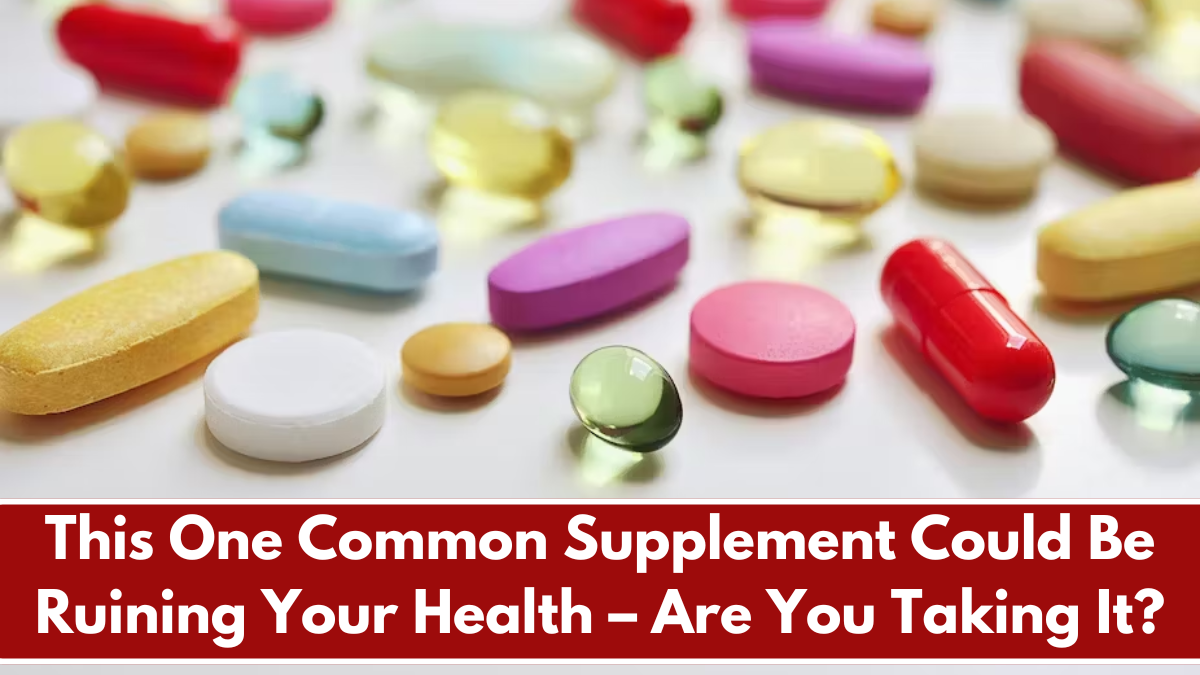In today’s health-conscious world, dietary supplements have become a multi-billion-dollar industry, promising benefits such as improved immunity, better digestion, enhanced cognitive function, and increased energy levels. Many people take supplements daily without giving much thought to their safety, trusting that if a product is available over-the-counter, it must be beneficial. However, what if one of the most common supplements on the market is actually harming your health instead of helping it?
There’s growing concern among health professionals about synthetic multivitamins, iron supplements, and certain fat-soluble vitamins that, when taken in excess or without medical supervision, could lead to serious health complications. The supplement industry is loosely regulated, which means that many products on the market contain hidden dangers, unproven claims, and misleading dosages. This article delves into the risks of common supplements, explains how they can negatively impact your health, and offers guidance on making safer choices.
The Hidden Dangers of Over-the-Counter Supplements
1. Overloading on Fat-Soluble Vitamins (A, D, E, and K)
Unlike water-soluble vitamins such as vitamin C and B-complex, which are excreted through urine when consumed in excess, fat-soluble vitamins accumulate in fat tissues and the liver. This can lead to toxicity if high doses are consumed regularly. For example:
- Vitamin A toxicity can cause liver damage, dizziness, nausea, and even birth defects in pregnant women.
- Excessive Vitamin D can lead to dangerously high calcium levels, resulting in kidney stones and cardiovascular issues.
- Too much Vitamin E has been linked to an increased risk of bleeding disorders and even certain cancers.
- High doses of Vitamin K can interfere with blood-thinning medications and contribute to blood clotting problems.
Many people take these vitamins thinking they will boost their immune system or bone health, but without proper medical guidance, they may actually be doing more harm than good.
2. The Risks of Iron Supplements
Iron supplements are commonly used to treat anemia and low energy levels, but excessive iron intake can be dangerous. While iron is essential for oxygen transport in the blood, too much iron can lead to:
- Oxidative stress, which damages cells and accelerates aging.
- Increased risk of heart disease by promoting inflammation.
- Liver damage due to iron overload, especially in people with hereditary conditions like hemochromatosis.
For individuals who do not have a diagnosed iron deficiency, taking iron supplements without medical advice can lead to serious complications.
3. Synthetic Multivitamins: Are They Doing More Harm Than Good?
Multivitamins are among the most popular dietary supplements, but many contain synthetic nutrients that the body does not absorb as efficiently as natural sources. Some research suggests that synthetic vitamins may:
- Not provide the same health benefits as vitamins derived from whole foods.
- Contain unnecessary additives and fillers, which may cause digestive discomfort and allergic reactions.
- Lead to overconsumption, especially if taken alongside fortified foods.
Studies have even found that some synthetic multivitamins may increase the risk of cancer in certain populations. For example, high doses of beta-carotene supplements have been linked to a higher risk of lung cancer in smokers.
4. Unregulated Herbal Supplements: Not Always Safe
Herbal supplements such as St. John’s Wort, kava, and yohimbe are often marketed as natural remedies for mood disorders, stress, and energy enhancement. However, these supplements can have serious side effects and dangerous drug interactions:
- St. John’s Wort can interfere with antidepressants and birth control pills, reducing their effectiveness.
- Kava has been linked to liver toxicity and failure.
- Yohimbe can cause rapid heart rate, high blood pressure, and anxiety.
Because the FDA does not regulate supplements as strictly as pharmaceuticals, many herbal supplements contain misleading labels, hidden contaminants, or inconsistent dosages.
The Problem with Supplement Industry Regulations
One of the biggest issues with the supplement industry is lack of regulation. In the U.S., dietary supplements do not require FDA approval before being sold. This means that:
- Manufacturers are not required to prove efficacy before marketing their products.
- Supplements may contain undisclosed ingredients, including heavy metals and harmful additives.
- Labels can be misleading, with actual dosages differing from what is listed on the bottle.
This lack of oversight has led to numerous cases of contaminated or mislabeled supplements causing serious health issues.
How to Safely Use Supplements
If you take supplements, consider these precautions to minimize risks:
- Consult a Doctor or Nutritionist – Before starting any supplement, get your nutrient levels checked and seek medical advice on whether you actually need it.
- Choose Third-Party Tested Brands – Look for certifications from organizations like USP, NSF, or ConsumerLab to ensure quality and purity.
- Opt for Whole Food-Based Supplements – These are better absorbed and come with additional beneficial compounds found in natural food sources.
- Avoid Mega-Doses – Stick to recommended daily values and avoid high-dose supplements unless prescribed by a doctor.
- Check for Interactions – If you take medications, research how supplements might interfere with them to prevent adverse effects.
Rethinking Supplement Use
While supplements can be beneficial when used correctly, they are not a substitute for a balanced diet and can pose risks if taken without proper knowledge. Many Americans consume supplements assuming they are always beneficial, but in reality, overuse or misuse can lead to toxicity, organ damage, and increased disease risks.
To protect your health, it’s crucial to be informed, cautious, and selective about what you put into your body. Instead of relying on synthetic pills, aim to get nutrients from whole foods such as fruits, vegetables, lean proteins, and healthy fats. And if you do need a supplement, always consult a healthcare professional to ensure you are making the safest choice.
FAQ’s:
1. Why are some common supplements harmful to health?
Many people assume that supplements are safe simply because they are available over the counter. However, certain supplements can be harmful when taken in excessive amounts or without proper medical supervision. Some supplements contain synthetic ingredients that the body may not process efficiently, leading to toxicity or nutrient imbalances. Others, like iron and fat-soluble vitamins (A, D, E, and K), can accumulate in the body, causing serious health risks such as organ damage, toxicity, or increased disease risks. Furthermore, the supplement industry is not strictly regulated, meaning some products may contain contaminants, hidden additives, or incorrect dosages.
2. What are the risks of taking too many fat-soluble vitamins?
Fat-soluble vitamins (A, D, E, and K) accumulate in body fat and the liver, making them difficult to excrete. This can lead to toxic effects if consumed in high amounts.
- Vitamin A toxicity can cause liver damage, nausea, dizziness, and birth defects in pregnant women.
- Excess Vitamin D can raise calcium levels too high, potentially leading to kidney stones, heart problems, and bone pain.
- Too much Vitamin E has been linked to an increased risk of bleeding disorders and even cancer.
- High doses of Vitamin K can interfere with blood-thinning medications, increasing the risk of blood clots.
Taking these vitamins in supplement form without medical guidance can do more harm than good.
3. Is it possible to overdose on iron supplements?
Yes, iron overload is a serious condition that can damage the body. While iron is essential for oxygen transport and energy production, excess iron builds up in the organs, leading to oxidative stress, liver damage, and an increased risk of heart disease. Some people, especially those with hereditary hemochromatosis, are at a higher risk of iron toxicity. Overdosing on iron can cause severe gastrointestinal distress, nausea, vomiting, and long-term complications. Unless prescribed by a doctor, most people should not take iron supplements without testing their iron levels first.
4. Are synthetic multivitamins as effective as natural vitamins?
Many synthetic multivitamins are not absorbed as efficiently as nutrients from whole foods. Some studies suggest that the body does not process synthetic vitamins in the same way, making them less beneficial than their natural counterparts. Additionally, many cheap multivitamins contain artificial fillers, binders, and unnecessary additives, which can cause digestive discomfort or allergic reactions. Some synthetic versions of vitamins (such as synthetic beta-carotene) may even increase health risks, including a higher likelihood of lung cancer in smokers. Instead of relying on multivitamins, it’s better to get nutrients from a balanced diet with fresh fruits, vegetables, lean proteins, and healthy fats.
5. Are herbal supplements always safe?
No, many herbal supplements can cause side effects and interact with medications. Since the supplement industry is not well-regulated, some herbal products contain undisclosed ingredients, contaminants, or inconsistent dosages. For example:
- St. John’s Wort can interfere with antidepressants, birth control pills, and blood thinners.
- Kava has been linked to liver toxicity and failure.
- Yohimbe can cause high blood pressure, anxiety, and heart palpitations.
Just because an ingredient is “natural” does not mean it is safe for everyone. Consulting a doctor before taking herbal supplements is crucial.
6. Why do some supplements contain heavy metals and toxins?
Since dietary supplements are not as strictly regulated as pharmaceuticals, some products have been found to contain harmful contaminants such as lead, arsenic, mercury, and cadmium. These heavy metals can accumulate in the body over time, leading to toxicity, neurological damage, and organ failure. Low-quality supplements, especially those manufactured in countries with poor quality control, are at higher risk of contamination. To avoid this, always choose supplements that have been third-party tested by organizations like USP, NSF, or ConsumerLab.
7. Can supplements interact with prescription medications?
Yes, many supplements can interfere with prescription medications, either by enhancing or reducing their effects. This can be dangerous, leading to serious side effects or reduced effectiveness of medications. Some common interactions include:
- Calcium and magnesium supplements interfering with the absorption of antibiotics and thyroid medications.
- Vitamin K reducing the effectiveness of blood-thinning medications (such as warfarin).
- Fish oil supplements increasing the risk of bleeding when taken with aspirin or anticoagulants.
Before taking any supplement, always check with your doctor or pharmacist to ensure there are no harmful interactions.
8. Are high-protein supplements bad for your kidneys?
For most healthy individuals, moderate protein intake is not harmful. However, excessive protein supplementation, especially from powders and processed sources, can strain the kidneys over time. This is especially concerning for people with pre-existing kidney disease or those at risk for kidney problems. High protein intake increases the kidneys’ workload by forcing them to filter excess nitrogen waste from protein metabolism, which may contribute to kidney damage over time. Instead of relying on protein supplements, it’s better to consume protein from whole food sources like lean meats, eggs, beans, and dairy.
9. What is the biggest issue with the supplement industry?
One of the biggest problems with the supplement industry is lack of regulation and transparency. Unlike prescription drugs, supplements do not need FDA approval before being sold. This means that manufacturers can:
- Make misleading health claims without strong scientific evidence.
- Sell products with incorrect dosages or unlisted ingredients.
- Include harmful fillers, artificial colors, or contaminants.
Many supplements fail independent quality tests due to incorrect labeling, poor ingredient sourcing, or contamination. Consumers should always research brands, look for third-party testing, and avoid supplements with exaggerated health claims.
10. How can people safely take supplements?
To take supplements safely, follow these guidelines:
- Get tested before supplementing – Instead of guessing, have your doctor check your nutrient levels.
- Choose third-party tested brands – Look for USP, NSF, or ConsumerLab certifications.
- Stick to whole food-based supplements – These are more bioavailable and safer than synthetic versions.
- Avoid mega-doses – Taking more than the recommended daily allowance can be dangerous.
- Check for drug interactions – If you take medications, ensure your supplements won’t interfere.
- Focus on diet first – Whole foods provide nutrients in their most natural and effective form.
By following these steps, you can reduce the risks associated with supplements and make informed decisions about your health. If you are unsure about a supplement, always consult with a doctor, nutritionist, or pharmacist before taking it.



